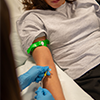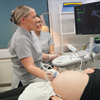Pregnancy is a time of remarkable change and growth, both for the baby and the mother. Proper nutrition plays a crucial role in supporting these changes, particularly during the first trimester when the baby’s development is most rapid. Prenatal vitamins and supplements are designed to provide essential nutrients that may be difficult to obtain in sufficient amounts through diet alone. This guide explores the key vitamins and minerals necessary during early pregnancy, with an emphasis on following NHS advice and consulting with a midwife or GP before starting any supplements.
Essential Prenatal Nutrients
1. Folic Acid
Folic acid, the synthetic form of folate, is vital in the early stages of pregnancy. It supports the formation of the neural tube, which develops into the baby’s brain and spinal cord. The NHS recommends that women take a daily supplement of 400 micrograms of folic acid from before conception until the 12th week of pregnancy. This helps reduce the risk of neural tube defects, such as spina bifida. In addition to supplements, consuming foods rich in folate, such as green leafy vegetables, legumes, and fortified cereals, is advisable.
2. Iron
Iron is crucial for producing haemoglobin, the protein in red blood cells that carries oxygen. During pregnancy, a woman’s blood volume increases to support the growing baby, making adequate iron intake essential. Low iron levels can lead to anaemia, causing fatigue and other health issues. While iron is included in many prenatal vitamins, it is important to consult with a healthcare professional to avoid excessive intake, which can cause gastrointestinal issues.
3. Calcium and Vitamin D
Calcium is essential for building the baby’s bones and teeth, while vitamin D helps regulate calcium and phosphate in the body, ensuring healthy bones, teeth, and muscles. The NHS advises pregnant and breastfeeding women to take a daily supplement containing 10 micrograms of vitamin D. Dietary sources of calcium include dairy products, leafy greens, and fortified plant-based alternatives. If dietary intake is insufficient, a healthcare provider may recommend calcium supplements.
4. Iodine
Iodine is important for the baby’s brain development. Although routine iodine supplementation is not typically recommended by the NHS, ensuring an adequate intake through diet is essential. Iodine can be found in dairy products, fish, and iodised salt. If there are concerns about iodine levels, it is important to discuss them with a midwife or GP.
5. Omega-3 Fatty Acids
Omega-3 fatty acids, particularly DHA, are important for the baby’s brain and eye development. While they are not always included in prenatal vitamins, they can be obtained from oily fish such as salmon, mackerel, and sardines. For those who do not consume fish, omega-3 supplements derived from algae are an alternative, but it is advisable to consult a healthcare provider before starting any new supplements.
Choosing the Right Prenatal Vitamin
When selecting a prenatal vitamin, look for one that contains:
- Folic Acid: 400 micrograms
- Iron: Around 17 milligrams
- Vitamin D: 10 micrograms
- Calcium: 200-300 milligrams
- Iodine: If recommended by a healthcare professional
It is important to note that supplements containing vitamin A (retinol) should be avoided during pregnancy, as excessive amounts can be harmful to the baby.
Consulting Healthcare Professionals
Before starting any new vitamin or supplement during pregnancy, it is essential to consult with a midwife or GP. They can provide personalised advice based on your individual health needs and dietary intake, ensuring the safety and well-being of both you and your baby.
Conclusion
Choosing the right prenatal vitamins and supplements is a key part of ensuring a healthy pregnancy. By following NHS guidelines and seeking advice from healthcare professionals, you can make informed decisions that support the development of your baby and your overall health. Always remember that supplements should complement a balanced diet, not replace it, and professional guidance is vital for a safe and healthy pregnancy journey.













 Packages & Prices
Packages & Prices  Important Info & Policies
Important Info & Policies  Your Scan
Your Scan